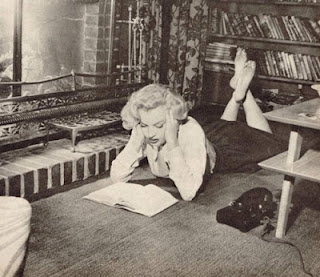Thursday, July 5, 2012
Does It Matter What You Read?
Friday, April 22, 2011
There's More Than One Way to Read
But not all books fit in this cycle, or rather, my standard reading cycle doesn't work for all books. Two of the books I haven't finished, I didn't finish because they demanded reading styles that didn't fit with mine at the time I tried to read them. The thing is, they're both good books (one of them might have been the best novel of the year it was released) and the problem was not with them, but with me. I applied the wrong reading technique and my struggles came from that.
Wtiz by Joshua Cohen is a big, challenging, brilliant, wonderful novel. It's the story of Ben Israelian who is the last remaining Jew after a mysterious plague wiped out all of the others. He is eventually taken by a shadow government cabal whose plans for him include marrying him off to the daughter of the current President of the United States. Cohen does a lot with this conceit, examining politics, celebrity, the tension between ethnic and religious identity and other big topics, but even with the plot, the real force of the novel is the language. Wild, vibrant, chaotic, (in the scientific sense) challenging, beautiful sentences. With a book like Witz, two reading styles really work; either you give your life to the work and completely inhabit the language, learning its idiosyncratic structures and rhythms the way you would memorize the lyrics of your favorite new album and immersing yourself in the world and the characters that inhabit it (and Witz is a world); or you wander in and out, pick it up, read a few pages, in chronological order or not, and then put it down again, keeping it always within reach, but never on your reading schedule. Witz should be read either as one moves to a new city or as one flaneurs through their neighborhood.
Of course, I was over halfway through and exhausted with it, through the application of my standard style before I figured out what I was doing wrong. I haven't given up on it though. It's within reach if not on my schedule and every now and again I move the bookmark a little further in the story.
Teju Cole's Open City is another book that is best read as one wanders around a city. You see, the protagonist is a Nigerian immigrant working as a psychiatrist in New York City, who finds himself coping with the challenges of his job by taking long walks. Essentially, we should read the book as it is written, like meandering wanderlustful walks. Pick it up, read it, and then take the ideas and images in the passage for a walk. Sometimes it's a quick stroll around the block and sometimes its an epic walk you need to call a cab to get home from. Regardless, it shouldn't be read with an eye towards “finishing” it. Luckily, I spotted the appropriate method before I'd invested too much ill-advised effort. Unluckily, it was a library book on a 7-day loan and there was no way I would be able to wander through the book in 7 days. (Incidentally, great book for an intelligent teenager. The English-as-second language diction means the prose is very accessible, but the thinking the narrator does is intelligent and compelling. It's perfect for a young intellectual still discovering how to use their intelligence.)
It's one of those statements once said, looks obvious; there are many different kinds of books, so there should be many different ways to read. But when we learn to read, that range of reading is drastically limited by the structure of our schooling. You can't really wander through a novel when you have a reader response due on Wednesday about chapters 1-5. Nor can you create an idiosyncratic order for your reading as, rather practically, the teacher needs everyone on the same page to teach. (Which makes Unfortunates, one the 20th Century's great works of English language fiction unteachable as it has no stable page numbers.) And some works are too long to fit into the semester or quarter schedule, especially given that nearly all literature courses demand the teaching of multiple works. And then there are the works that really need to be re-read to be appreciated, leaving teachers and professors scrambling to convince their students of a depth that is inherently invisible to them. ("Waterproof!") And as anyone who's gone to school knows, you can't give your intellect to a single work without really hurting your grades in other subjects.
Great works of literature find ways to tell readers how to read them. Whether it's a line about interacting with art, something even more direct like a character talking about reading, or an aspect of style, great authors find ways to suggest the best perspective from which to view their work. But sometimes its a process of discovery and sometimes that discovery comes later than others. But part of the joy of reading for yourself is the freedom to discover, not just new books, but new ways of reading. In that case, you're not just transported to a new world, you're transformed into a new person.



